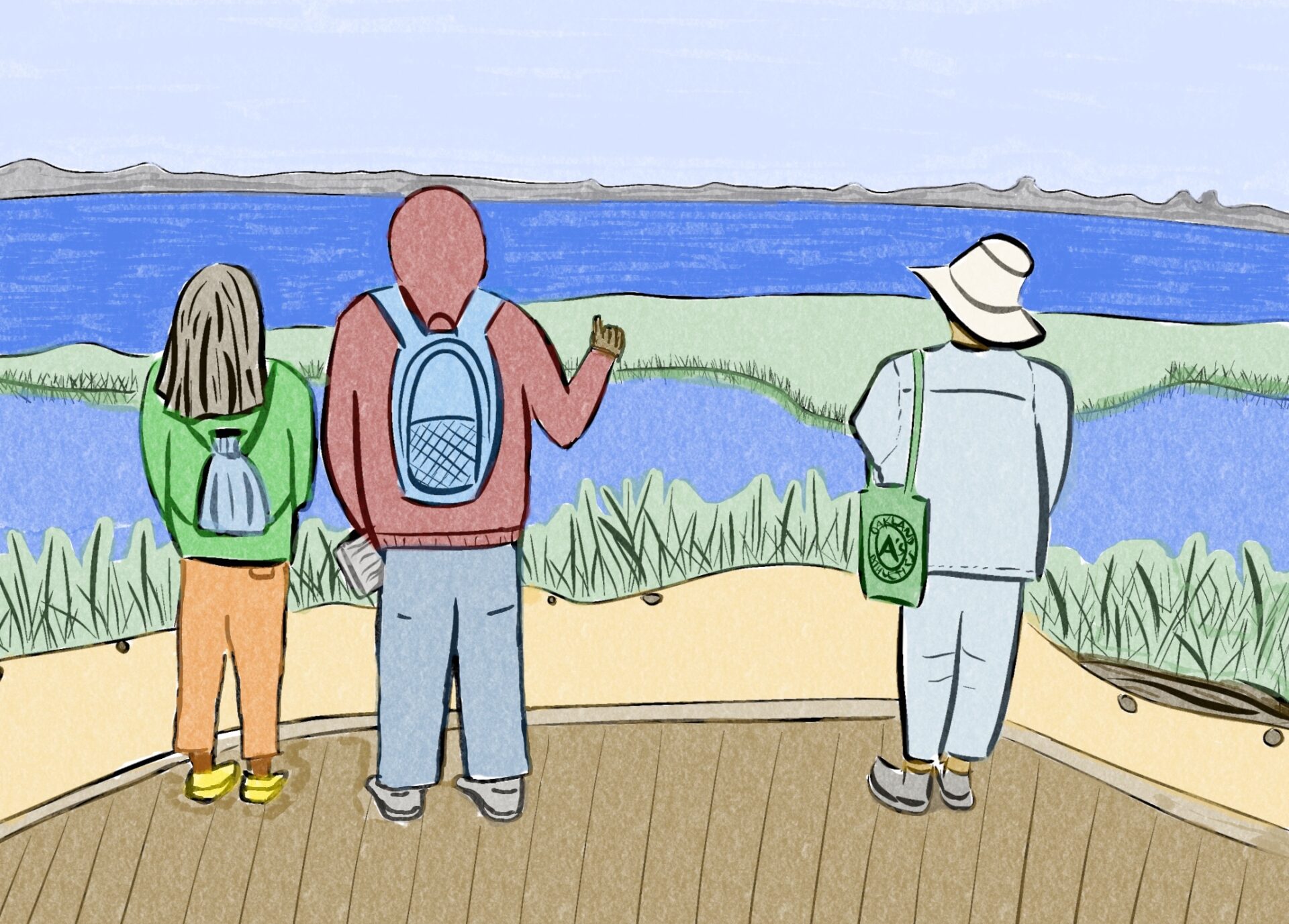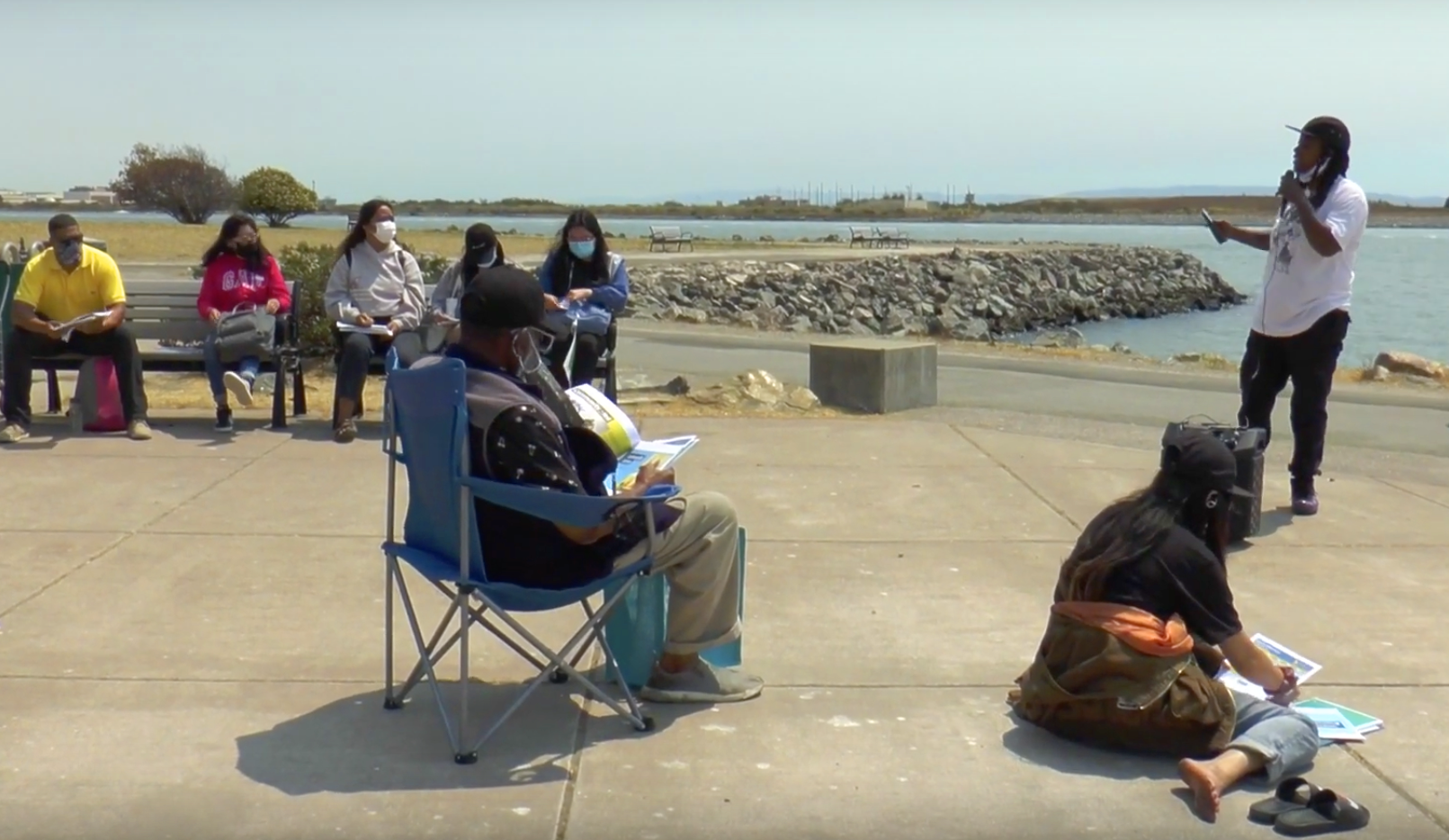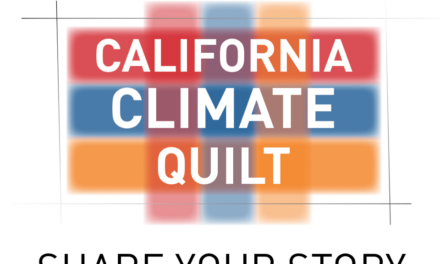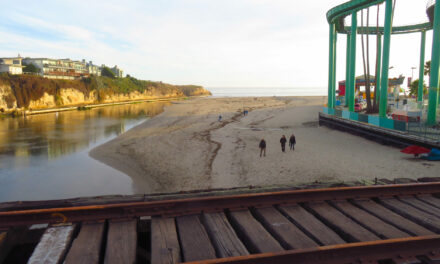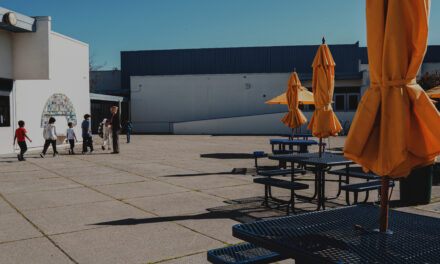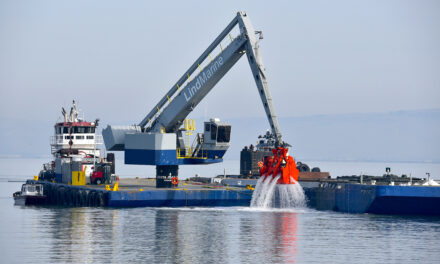More Training Academies Percolating
Art: Audrey Brown
An academy program that trains local residents to influence shoreline land use decision-making is expanding from Oakland into new Bay Area jurisdictions. New academies in Contra Costa County and the City and County of San Francisco are proposed to launch in the next two years with $260,000 in Bay Conservation and Development Commission infrastructure investment funds. Up to six new programs could begin as soon as this summer, pending additional funding. With sea level rise fast creeping up on Bay Area shores, involving impacted communities in planning and adaptation is becoming more urgent, and the academies can help.
The Oakland Shoreline Leadership Academy first launched in the summer of 2021 in collaboration with the West Oakland Environmental Indicators Project with $180,000 from the San Francisco Bay Restoration Authority. Over six months, the program equipped 14 Oaklanders to give input into the city’s shoreline planning process.
Academy director Phoenix Armenta conceived of the initiative after observing that people living in the communities affected by local government planning processes lacked pathways to meaningful involvement in those decisions.
Climate impacts added urgency to the problem. Few people in the Bay Area are equipped to advise on how to adapt to sea level rise and fewer are also representative of communities in the future flood zone, according to Armenta, now Senior Manager for Climate equity and Community Engagement at BCDC. This local problem is part of a more widespread one: people of color are underrepresented in environmental fields and especially in positions of power, even though they are most impacted by environmental problems.
“It’s really important that we get people on committees and in the room who have that knowledge and are also from the community,” says Armenta.
The consequences of excluding local residents from those decisions have historically been dire. Armenta points to redlining, or discriminatory bank lending practices which began in the 1930s, as an example of urban planning that excluded impacted residents to devastating effect. Low- income residents, immigrants, and people of color were denied loans to buy homes. The resulting inequality in generational wealth has rippled on for nearly a century.
Through the academies program, Armenta hopes locals invested in and representative of their communities can gain the knowledge and skills to weigh in on planning processes and then pay it forward by demystifying such processes for their friends and neighbors. The pilot academy prepared participants through site visits to shoreline areas and lessons from Bay Area scientists, environmental planners, and policymakers. Participants were paid $25 per hour for learning time and for communicating findings to their broader communities. The inaugural Oakland course enrolled 14 people, and Armenta is planning for 20 in each of the coming academies.
Early session of the pilot academy on the Oakland waterfront. Photo: Kristine Wong
Though the original program guided participants to develop a specific project proposal, Armenta plans to redirect future academies away from projects and toward preparation to serve on planning and advisory committees. The program alone wasn’t enough to equip people to see their projects to fruition, Armenta realized, mostly because of the challenges of fundraising. While some spinoff projects may yet come to fruition, one particular project called Sacred Sites has already landed funds to move forward (with another Restoration Authority grant pending approval this March).
Bringing Sacred Sites to fruition took a big bet. Academy graduate Shy Walker worked unpaid for a year on the project while juggling school and work, something their fellow participants couldn’t or wouldn’t do. Then a godsend email arrived: an offer of seed funding plus fiscal sponsorship that would allow Walker to create their own nonprofit organization. Walker has since raised an additional $250,000 for Sacred Sites, a multipurpose shoreline park in Oakland with features including habitat restoration, a workforce development program, public art, a performance venue, and a resilience hub.
Getting more locals who are tapped into the community’s needs to participate in decision-making committees counts as a success in Armenta’s book. If the funding comes through, Armenta plans to expand the program further to jurisdictions that tentatively include San Rafael, East Palo Alto, and South San Francisco. Armenta also plans to eventually host academies in Spanish and is in early talks about creating one with a Native tribe.
Meanwhile, about half of Walker’s academy cohort now serve on some sort of planning advisory committee, presiding over decisions that affect regional wetlands, air quality monitoring, and Lake Merritt.
Walker serves on the People and Wetlands Working Group for a regional monitoring effort involving state and local agencies. They say the academy prepared them to identify oversights in committee deliberations, like the time when the group planned to administer a survey about park usage online only. Walker saw it would exclude anyone who lacked devices or digital literacy — people whose voices rarely get captured in land-use decisions — and convinced the group to offer a paper version.
“I bring a voice to that space that normally wouldn’t be heard,” says Walker.
Other Recent Posts
Assistant Editor Job Announcement
Part time freelance job opening with Bay Area climate resilience magazine.
Training 18 New Community Leaders in a Resilience Hot Spot
A June 7 event minted 18 new community leaders now better-equipped to care for Suisun City and Fairfield through pollution, heat, smoke, and high water.
Mayor Pushes Suisun City To Do Better
Mayor Alma Hernandez has devoted herself to preparing her community for a warming world.
The Path to a Just Transition for Benicia’s Refinery Workers
As Valero prepares to shutter its Benicia oil refinery, 400 jobs hang in the balance. Can California ensure a just transition for fossil fuel workers?
Ecologist Finds Art in Restoring Levees
In Sacramento, an artist-ecologist brings California’s native species to life – through art, and through fish-friendly levee restoration.
New Metrics on Hybrid Gray-Green Levees
UC Santa Cruz research project investigates how horizontal “living levees” can cut flood risk.
Community Editor Job Announcement
Part time freelance job opening with Bay Area climate resilience magazine.
Being Bike-Friendly is Gateway to Climate Advocacy
Four Bay Area cyclists push for better city infrastructure.
Can Colgan Creek Do It All? Santa Rosa Reimagines Flood Control
A restoration project blends old-school flood control with modern green infrastructure. Is this how California can manage runoff from future megastorms?
San Francisco Youth Explore Flood Risk on Home Turf
At the Shoreline Leadership Academy, high school students learn about sea level rise through hands-on tours and community projects.






